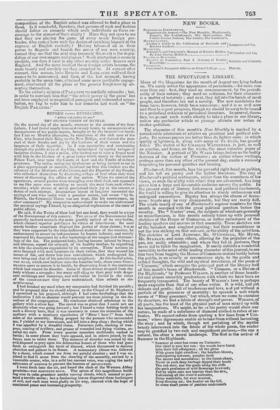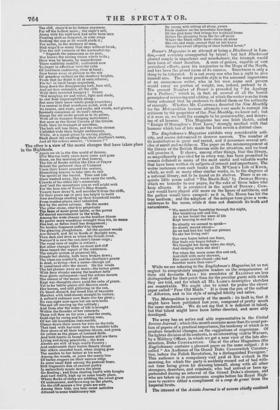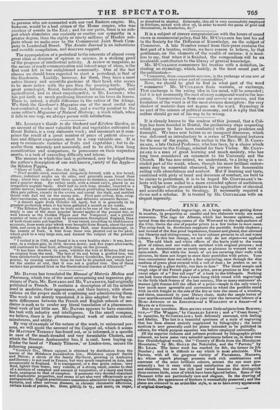NEW BOOKS.
PERIODICAL LITERATURE,
Magazines for August.—The New Monthly, Blackwood's, Fraser's, The Englishman's, The Metropolitan, The United Service Journal, The Asiatic, The Gardener's.
HORTICULTURE,
Lindley's Guide to the Cultivation of Orchards and 1
Longman and Co. Kitchen Gardens -
MEDICINE,
Edwards's and Vavassear's Manual of Materia DIedica. 1 Whittaker and Co.
By John Davies, 31.1t C S -
POLITICAL ECONOMY,
Treatise on Commerce, Part I. (Library of Useful 1 Baldwin and Cradock.
Knowledge)
TIIEOLOCY,
COOybeare'S Inaugural Address at Bristol College Murray.
THE SPECTATOR'S LIBRARY.
MOST of the Magazines for the month of August are lying before us. We rarely notice the appearance of periodicals,—for more rea- sons than one : first, they need no announcement, by the periodi- cality of their nature ; they need no criticism, for their character is a matter of notoriety ; and next, they fall into the hands of most people, and therefore are not a novelty. The new candidates for fame have, however, lately been numerous ; and it is as well now and then to report progress, though we should be sorry to be bound to a periodical criticism of periodical literature. In general, there- fore, we permit such works silently to take a place in our library, unless any particular article or passage attracts our notice or invites quotation.
The character of this month's New Monthly is marked by a considerable admixture of articles on practical and political sub- jects. Its serious papers are better than its lighter ones : in which quality of lightness, it, along with many of its rivals, has greatly! failed. The sketch of Sir CHARLES WETHERELL is just, as well as graphic, and forms, on the whole, the most valuable paper of the Number. A portrait or Mr. WARD brings before us the bodily features of the author of Tremaine ; an author whose writings, perhaps more than any other of the present day, excite a curiosity respecting his personal qualities and bearing.
Blackwood, this month, lays his powerful right hand on politics, and his left on poetry and the lighter literature. The fury of Blackwood's political sentiments, rather than the soundness of his views, or even the ability with which they are advocated, has long given him a large and favourable audience among the public. In the present state of literary listlessness and political excitement, the world is willing to give its attention to sturdy enthusiasm and unfeigned earnestness. Bigotry has always the charm of fierce- ness: bigots may be very disagreeable, but they are rarely dull. The whole nearly of one of Blackwood's copious numbers for this month is occupied with the great political question before the country. The " Noctes" even, the subjects of which are generally so miscellaneous, is this month entirely taken up with personal sketches of the House of Commons, or rather caricatures of the leading speakers and movers in that assembly. These sketches are of the broadest and roughest painting ; but their resemblance is not the less striking on that account, or the ability of the artist less. The sketches of Lord ALTHORP, Mr. 0.CONNELL, Mr. HUNT, Mr. STANLEY, and some others, allowing for the prejudice of the pen, are really admirable ; and where they fail in justness, they never fail to tickle the imagination. It surely exhibits a wonderful versatility in the mind of the leading character of this journal, to see him turn from lugging the House of Commons orators bodily before the public, in no courtly or ceremonious style, to the gentle and refined thoughts, the wild and mystical inventions, of the poem of " Unimore," which occupies the principal part of the literary half of this month's brace of Blackwoods. " Unimore, or a Dream of the Highlands," by Professor WILSON, is another of those beauti- ful and almost unearthly productions with which we have been so frequently transported. The beauty of Wrasoar's tone is perhaps more exquisite than that of any other writer. It is wild, and yet delicate and gentle; full of tenderness and love, and yet without a particle of the grossness of mortality: he spreads a web which seems of " filmy gossamer," but which, when we come to examine
its structure, we find a fabric of strength and power. WILSON, of all poets, has the least of the physical part of man mixed up with his imaginations. We might, as far as his poetry would show our nature, be made of a substance of diamond clothed in robes of as- bestos. We cannotrefrain from quoting a few lines from Uni- more," where digressions enable us to take them without lacerating the story ; and by which, though not partaking of the mystic beauty interwoven into the fabric of the whole poem, the reader maybe gratified by two rich and magnificent pietures,—the one a natural, the other a moral landscape. The first is the arrival of Summer in the Highlands.
" Summer at once has come on Unimore; Her chief is now her sun : the woods have burst Into their full effulgence ; all the glens With green light overflow; the heather-bloom, Anticipating autumn, purples faint The moors and mountains; in the forest-chase, Never in such deep herbage dipped their hoofs The red-deer, nor the goats along the cliffs On such profusion of wild flowerage browsed; Fed by night-rain not heavier than the dew, Enlivening all the river'd solitudes, Steep waterfalls, for ever musical,
Keep dinning on ; the hunter on the hill, In some short pause of pastime underneath
The cliff, cheer'd as he listens unawares Far off the hollow noise ; the eagle's self, Along with his wild bark had ne'er been seen Floating aloft so frequent, in wide rings Seeking the sun as he would circle it; For never, in the memory of man, Had reign'd so many blue days without break, O'er the still vastness of the unclouded sky. " Expands the panorama as we gaze, Nor knows the roving vision where to fix; Here won by beauty, by magnificence There suddenly assail'd ; contented now To linger in affection 'mid the calm Of loveliness endearing, close at hand ; Now borne away in passion to the stir Of grandeur restless on the shadowy heights.
From that far flight it all at once returns; For lo ! in lucid range majestical, Deep down the disappearing loch, how still, And yet how animated, all the cliffs With their inverted imagery 1 Swans 'Mid mingling air and water, light and shade, In rest float imperceptibly along ; But soon their snow-white pomp evanishes ; For central in that wondrous world, with all Its towers, and roofs, and rocks, and woods, and groves, Serenely conscious of its lord's return, Hangs the old castle proud as in its prime, With all its banners drooping motionless ; But soon as the Great Cavern of the Gloom Doth blow its trumpet at meridian, The loch will lose them, and the castle stream Unfolded wide their bright emblazonry, While, at a signal given by waving plumes, Shall shout the exulting clan their chieftain's name, And all the echoes answer, • Unimore "
The other is a view of the moral changes that have taken place in the Highlands.
"Again we sit in the dim world of dreams.
O'er Morven forty years have come and gone Since, on the morning of that funeral, The Isle of Rocks within the Glen of Prayer Beheld the gathered clan of Unimore Upon their knees around the oratory, Beseeching heaven to take into its rest The spirits of the buried. Time and tide Have washed away, like weeds upon the sands, Crowds of the olden life's memorials, And 'mid the mountains you as well might seek For the lone site of Fancy's filmy dreams.
Towers have decay'd, and moulder'd from the cliffs, Or their green age or grey has help'd to build New dwellings sending up their household smoke From treeless places once inhabited But by the secret sylvans. On the moors The pillar-stone, rear'd to perpetuate The fame of some great battle, or the power Of storied necromancer in the wilds, Among the wide change on the heather-bloom
By power more wondrous wrought than his, its Mlle
Has lost, or fallen itself has disappeared; No broken fragment suffer'd to impede The glancing ploughshare. All the ancient woods Are thinn'd, and let in floods of daylight now, Then dark and dern as when the Druids lived.
Narrow'd is now the red-deer's forest-reign; The royal race of eagles is extinct; But other changes than on moor and cliff Have tamed the aspect of the wilderness.
The simple system of primeval life, Simple but stately, hath been broken down ; The clans are scatter'd, and the chieftain's power Is dead, or dying—but a name—though yet It sometimes stirs the desert. On the winds The tall plumes wave no more—the tartan green With fiery streaks among the heather-bells Now glows unfrequent—and the echoes mourn The silence of the music that of old Kept war-thoughts stern amid the calm of peace_ Yet to far battle-plains still Morven sends Her heroes, and still glittering in the sun, Or blood-dimm'd, her dread line of bayonets Marches with loud shouts straight to victory.
A soften'd radiance now floats o'er her glens; No rare sight now upon her sea-arm lochs The sail oft veering up the solitude ; And from afar the noise of life is brought Within the thunder of her cataracts.
These will flow on for ever ; and the crests, Gold-tipt by rising and by setting suns, Of her old mountains inaccessible, Glance down their scorn for ever on the toils That load with harvests new the humbler hills Now shorn of all their heather-bloom, and green Or yellow as the gleam of lowland fields. And bold hearts in broad bosoms still are there Living and dying peacefully ; the huts Abodes are still of high-sourd Poverty ; And underneath their lintels Beauty stoops Her silken-snooded head, when singing goes. The maiden to her father at his work Among the woods, or joins the scanty.line Of barley-reapers on their narrow ridge In some small field among the pastoral braes.
Still fragments dim of ancient poetry In melancholy music down the glens Go floating; and from shieling roof'd with boughs And turf-walPd, high up in some lonely place, Where socks of sheep are nibbling the sweet grass Of midsummer, and browsing on the plants, On the cliff-mosses a few goats are seen Among their kids, you hear sweet melodies Attuned to some traditionary tale By young wife sitting all alone, aware From shadow on the mountain-horologe Of the glad hour that brings her husband home Before the gloaming from the far-off moor Where the black cattle feed—there all alone She sits and sings, except that on her knees Sleeps the sweet offspring of their faithful loves."
Fraser's Magazine is an attempt at being a Blackwood in Lon- don,—not certainly unsupported by talent; but had Blackwood gloried simply in impudence and nonchalance, the triumph would have been of short duration. A man of genius, capable of vast periodical efforts, gave his inspiration to the Maga of the North, and has been the grand cause of its success. Smartness is only a thing to be tolerated. It is not every one who has a right to give himself airs. The worst possible style is the assumed importance of an anonymous writer, who in his own name and person would carry no portion of weight, nor, indeed, pretend to it. The present Number of Fraser is preceded by " An Apology for a Preface," which is, in fact, an avowal of all the basest principles of reviewing and editing, of which the writer is so far from being ashamed that he professes to defend them on the authority of example. Whether Mr. CAMPBELL deserted the New Monthly for the Metropolitan because attempts were made to corrupt his criticism by the proprietor of the New Monthly, we know not ; but if it were so, we hold the example to be praiseworthy, and deserv- ing of all honour. This Magazine has one Irish sketch, called "Ensign O'Donoghue's First Love," strongly marked with that humour which has of late made the Irish novels a distinct class.
The Englishman's Magazine exhibits very considerable acti- vity, and seems determined to deserve success. The number of its contributors is great and varied, and it possesses several arti- cles of merit and usefulness. The paper on the mismanagement of the library of the British Museum calls for attention, and we trust will procure it. It shows, among other things, that this library, so magnificently provided for in every way, has been permitted to remain deficient in many of the most useful and valuable works that have been written on subjects of interest and importance. The writer instances even such books as Dr. M`Cnte's Life of Kxox, which, as well as many other similar works, is, to the disgrace of a national library, not to he found on its shelves. There is an ex- quisite little poem called "The Death-Bed," by rHOMAS HOOD; which we transfer to our pages, for the sake of those ladies who keep albums. It is conceived in the spirit of DONNE; COW- LEY would have played still more on the figure of antithesis, and the pathos would have escaped: as it is, Mr. HOOD has hit the true medium; and the adoption of the antique tone gives a vene- rableness to the verse, While it does not diminish its truth and naturalness.
" We watch'd her breathing through the night, Her breathing soft and low, As in her breast the wave of life Kept heaving to and fro I
So silently we seemed to speak— So slowly moved about—
As we had lent her half our powers To eke her living out!
Our very hopes belied our fears, Our fears our hopes belied—
We thought her dying when she slept, And sleeping when she died !
For when the morn came dim and sad, And chill with early showers, Her quiet eyelids closed—she had Another morn than ours !"
While we are referring to the Englishman's Magazine,let us not neglect to congratulate magazine readers on the reappearance of their old favourite ELIA : his anecdotes of ELLISTON are less distinguished for their point than for the peculiar gusto with which they are told, and for which all Mr. LAMB'S descriptive sketches are remarkable. We ought also to select for praise the clever paper called " Four Old Maids." It is from the pen of the author of Atherton, and in his style of mingled fidelity and satire.
The Metropolitan is scarcely of the month : its fault is, that it might have been published last year, composed of pretty much the same materials. We do not say that it is deficient in talent, but that talent might have been better directed, and more ably developed.
The army has an active and able representative in the United Service Journal ; which this month contains more than its usual por- tion of papers of a practical importance ;the tendency of which is to produce beneficial changes, on the suggestions of experience. Of the lighter division of its contents, is an interesting visit to Warsaw, by a Military Officer, in which we get a near view of the late abo- mination, Duke CONSTANTINE. One of the other Magazines (the Englishman) contains a pleasant paper on the same subject : it is called " An Audience of the Grand Duke Cesarowitch Constan- tine, before the Polish Revolution, by a distinguished Foreigner." This audience is a compulsory visit paid at five o'clock in the morning, for which the party is suddenly roused out of bed with- out time being given for dressing himself, along with all other strangers, deserters, and criminals, who had arrived or been ap- prehended during an interval of the Grand Duke's absence, and who are taken up in promiscuous couples before his Royal High- ness to receive either a compliment or a coup de grace from the Imperial brute. The interest of the Asiatic Journal is of course chiefly confined to persons who are connected with our vast Eastern empire. He, however, would be a bad citizen of the Home empire, who was i careless of events in the East ; and for our parts, there is no sub- ject which stimulates our curiosity or excites our sympathy in a greater degree, than the eighty or ninety millions of Hiudoo sub- jects whom we make over to the Commercial Joint Stock Com- pany in Leadenhall Street. The Asiatic Journal is an industrious and sensible compilation, and deserves support.
The appropriation of a periodical to the interests of almost every great class or division of opinion or science, is a striking proof of the progress of intellectual activity. A review or magazine, as the means of ready communication and interchange of ideas, is the first want felt in our enlightened community. One of the last classes we should have expected to start a periodical, is that of the Gardeners. Luckily, however, for them, they have a most active literary and scientific gardener at their head, who seems to be more active with the pen than the pruning-knife. This great pomologist, florist, horticulturist, botanist, zoologist, and agriculturist, and in short encyclopaedist, is Mr. LOUDON ; who has put forth as much gardening literature as his trees do leaves. There is, indeed, a slight difference in the colour of the foliage. We think the Gardener's Magazine one of the most useful and best-conducted works of the kind, and a worthy pendant to the same editor's Magazine of Natural History; a work which, when it falls in our way, we always peruse with satisfaction.




























 Previous page
Previous page